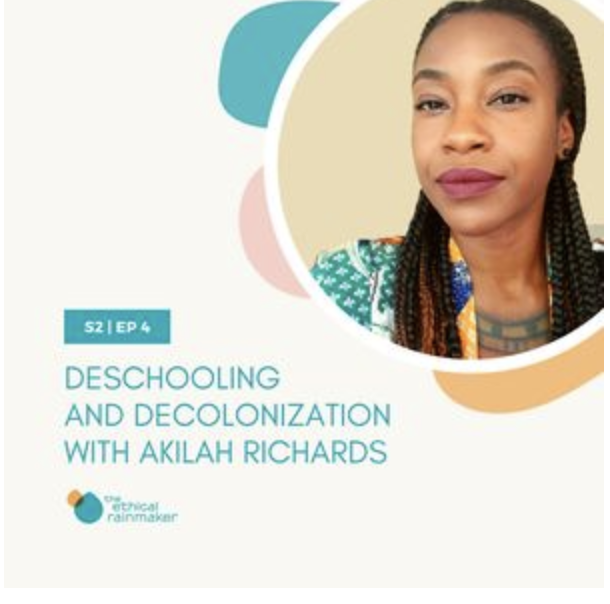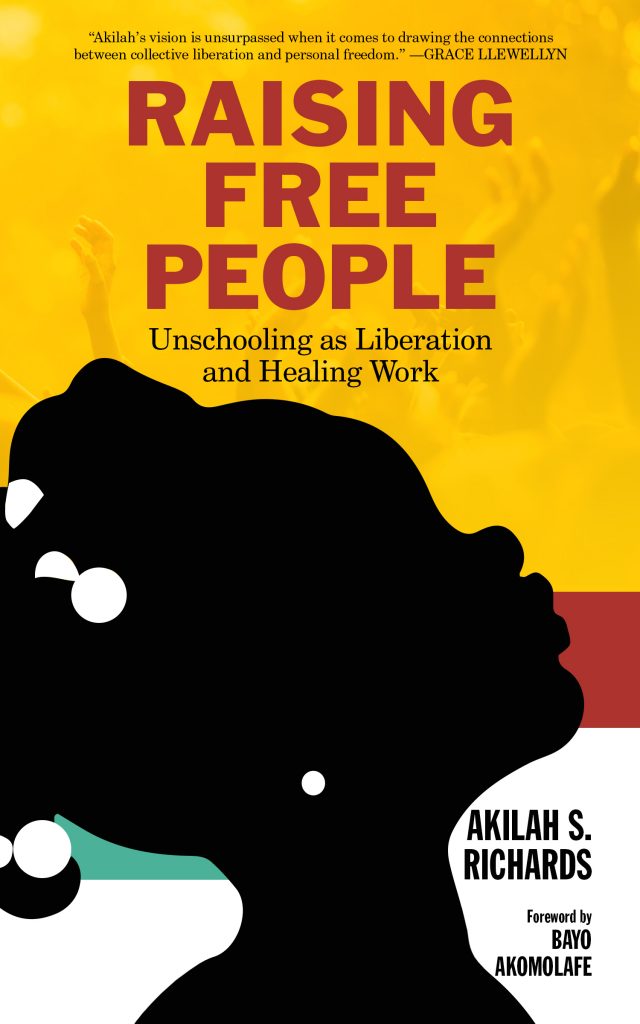March 30th, 2021 | 51:17 | S2:E4
Episode Summary
With her podcast, Fare of the Free Child, a Ted Talk, 10 books out and an entire network devoted to the unschooling community, hundreds of thousands of people have been tuning in to Akilah Richards’ body of work. In this episode, Michelle talks with Akilah about how we can decolonize ourselves, centering community and unschooling, which Akilah defines as “…shedding the programming and habits that resulted from other people’s agency over your time, body, thoughts or actions [and] designing and practicing beliefs that align with your desire to thrive, be happy and succeed…” This celebrated speaker, and organizer has just published her latest book, Raising Free People: Unschooling as Liberation and Healing Work. Tune in – you don’t want to miss this conversation.
Episode Notes
Akilah Richards shares several great resources that we’ve listed below…here are links for content and references mentioned in the show:
- Michelle talks with Akilah Richards of Raising Free People and the Fare of the Free Child podcast, based in Lawrenceville, Georgia…part of the self-directed education movement!
- Akilah is the author of ten books including her most recent,Raising Free People: Unschooling as Liberation and Healing Work
- …and she hosts the Fare of the Free Child
- If you become a fan and want to support her work, check out this fresh link and her Patreon.
References then Definitions:
- Unschooling: “… a child-trusting, anti-oppression, liberatory, love-centered approach to parenting and care giving. It also is about creating and expanding communities of confident, capable people who understand how they learn best and how to work collaboratively to learn and solve things. Because it really is, before you talk about learning, it’s about trust, it’s about looking at what liberation means intergenerationally, which includes learning, but not only that. And it’s about love. What does it mean if love is not just about my intention, but about something that’s actually surrounded by this ecology of accountability where I’m actually listening to the people who I’m loving on and what they’re saying and what they need, and then my love in action is shaped by that. All of those things are really what I understand unschooling to be.”
- Deschooling: ”…..shedding the programming and habits that resulted from other people’s agency over your time, body, thoughts or actions. It’s also … Yes. It’s also about designing and practicing beliefs that align with your desire to thrive, be happy and succeed. And those are the opposite of what has happened and continues to happen, because it’s happening still, colonization.”
- Student hood vs Personhood: “Much of what we do is to think about what would it mean if I wasn’t thinking about my child just from the perspective of student?…..So, when you start to do that work on your own self, in part by not focusing so much on your child’s studenthood, then you start to make the connection between the actual human, the child human, and some of the things that they’re advocating for or the things they’re pushing back against. You just start to really humanize your relationship intergenerationally in a way that makes it so that you can partner with a young person around their learning journey, which may or may not include school. It still might include it, but it brings in other things that are usually not a part of school, like consent and agency, confident autonomy, the nuances of what it means to collaborate in an environment that tells you that if you help somebody, you’re going to get in trouble and they’re going to get in trouble. Which is the most anti-humane thing ever.”
“And what we’re talking about now is moving away from young people needing to perform studenthood and their right to be violated as humans, and instead looking at a way that integrates the same stuff we talk about as adults when we’re in our 30s and 40s and 50s trying to get to who am I? What are my boundaries? How do I show up in the world in a way that is both affirming for me and welcoming for the sort of energies that I want to be part of? What happens when I’m super uncomfortable with someone or I don’t understand or don’t like, yet we have a common goal that we need to work through? These are real life situations that we do not get practice with in school.”
- Schoolishness: “The ways that we together are so colonized. We want a leader, we want somebody needs to be right, one person’s talking, the other people are listening. We do a lot of inhumane things that have become so normalized. And they didn’t just appear in adulthood, they didn’t just happen when you got that job with that one person. These are things that happen throughout our schooled lives. I call these things schoolishness. Not because they are rooted in school, but oftentimes school is where they are perpetuated.”
- Ecology of accountability: “…we find that in the self-directed spaces that’s often one of the things that’s missing. It’s like your intentions are there and then you have some resources and you see a need the way that you define it, so you go do something. Okay, but you need to be involved. So, we talked about this a little bit at the top of our conversation. Whoever it is that you feel like you want to impact, how can you get into community with them? Right now. How can you get in community with them?”
- Here is Akilah Richards’ Ted Talk
- Lane Santa Cruz https://www.tucward1.com/about
- Developing the Disrupters Ears https://www.rfpunschool.com/p/learningtolisten
- Crystal Bird farmer https://crystalbyrdfarmer.com/
- Free joy experience https://www.thefreejoyexperience.com/
- Mighty Networks https://my-reflection-matters.mn.co/
- Chemay Morales James https://www.linkedin.com/in/chemay-morales-james-5707764a/
- Thea Monyee https://www.theamonyee.com/
- Shawna Murray-Brown https://www.shawnamurraybrowne.com/
- Gratitude to Trick Candles for our theme song, called “I’m Gold”
The thing about this podcast is that it is self-funded! So if you love it, consider joining us on Patreon, and passing along to your friends and colleagues. Of course, it is super helpful to us too, when you subscribe on your fav pod player, and rate us! Write us any time at [email protected] or visit us at theethicalrainmaker.com
Show Contributors
Rachelle Pierce
trick candles
michelle shireen muri
isaac kaplan-woolner
kasmira hall
akilah richards







